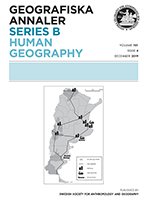Authors
Arve Hansen and Jostein Jakobsen
Abstract
The rapidly escalating production and consumption of meat across the world has drawn much attention in recent years. While mainstream accounts tend to see the phenomenon as driven by ‘natural’ processes of consumption pattern change through economic development, critical geographies have turned to exploring the uneven capitalist processes underpinning what Tony Weis calls ‘meatification’. In Weis’ view, meatification unfolds through what he calls ‘the industrial grain-oilseed-livestock complex’, which is presently becoming a dominant form of agricultural production worldwide. Simultaneously, but less thoroughly investigated in the emerging scholarship, meatification unfolds in and through everyday geographies of consumption that we conceptualize as variegated ‘meatscapes’. By bringing together critical geographers’ interest in the political economy of meat with practice theory and consumption research, this contribution furthers the geographical dialogue around the spatial transformations brought about by meatification. Looking at Vietnam and China as examples of rapidly meatifying countries, we explore the intersection of macro-scale spatial transformations through trade and commodity flows and, at the micro-scale, transformations in food practices. We thus argue for an approach to meatification that is multi-scalar and conducive to further regionally specific research of meatification in Asia and beyond.
Key words:
Meat, meatification, Asia, consumption, practice theory, political economy


